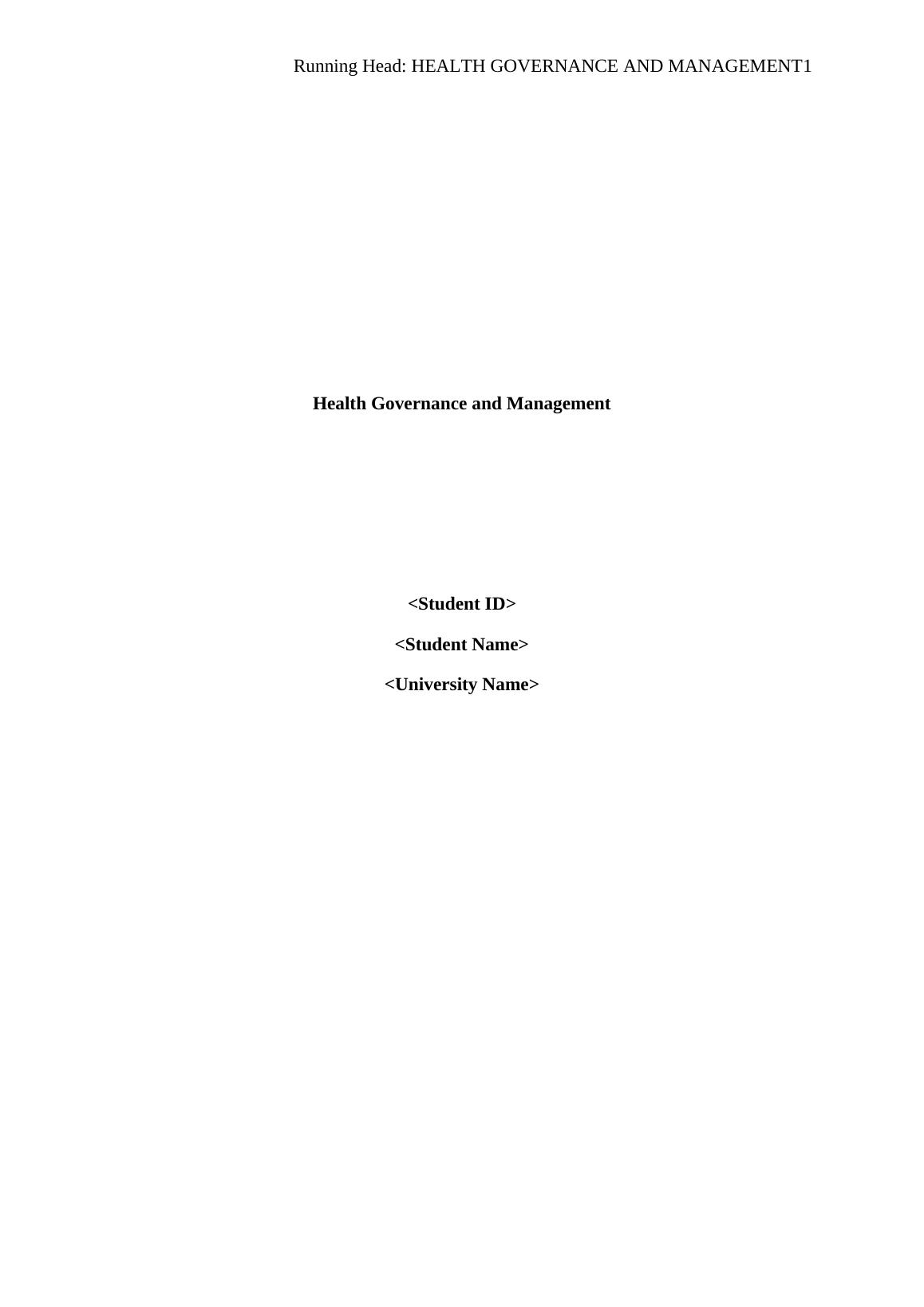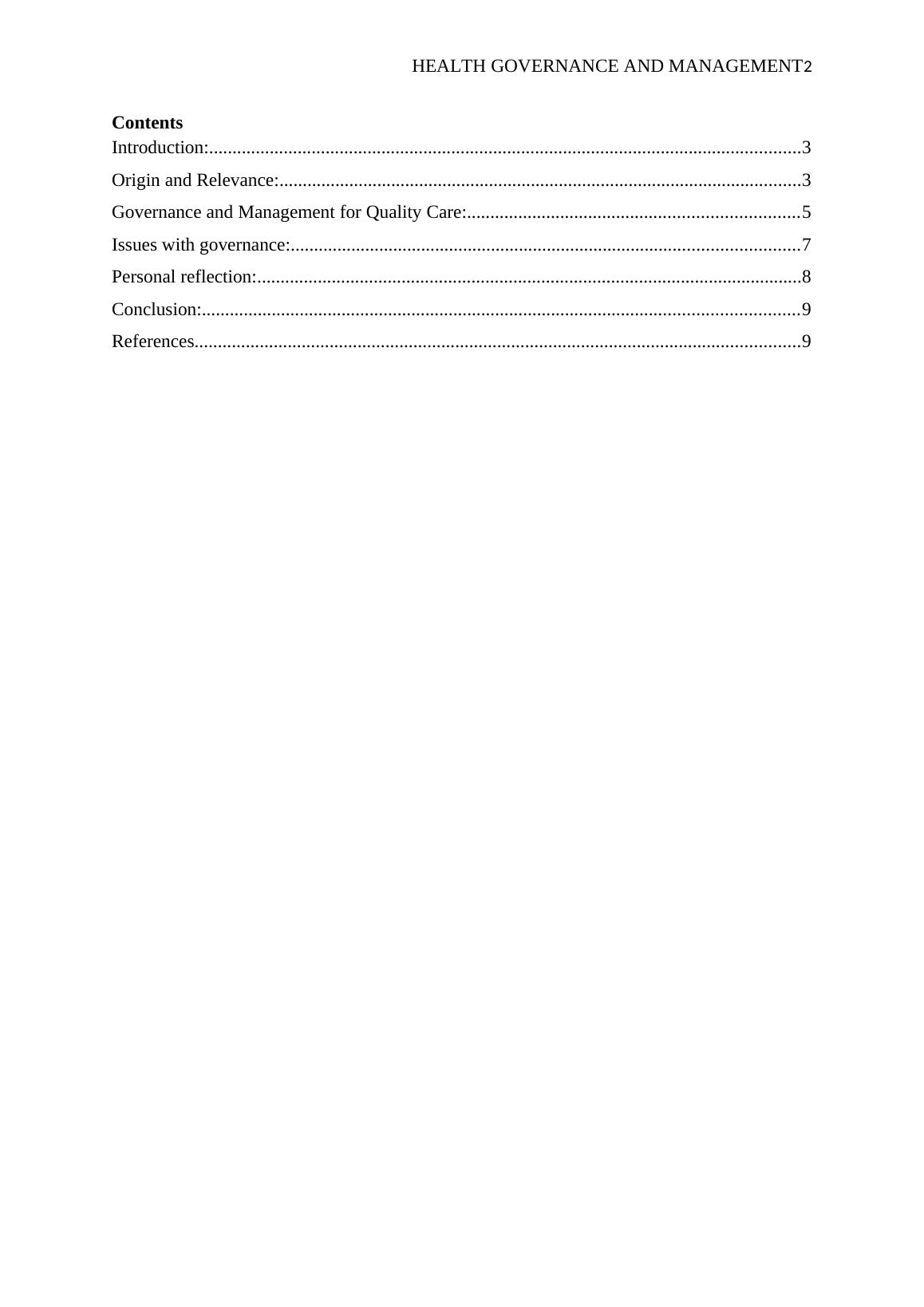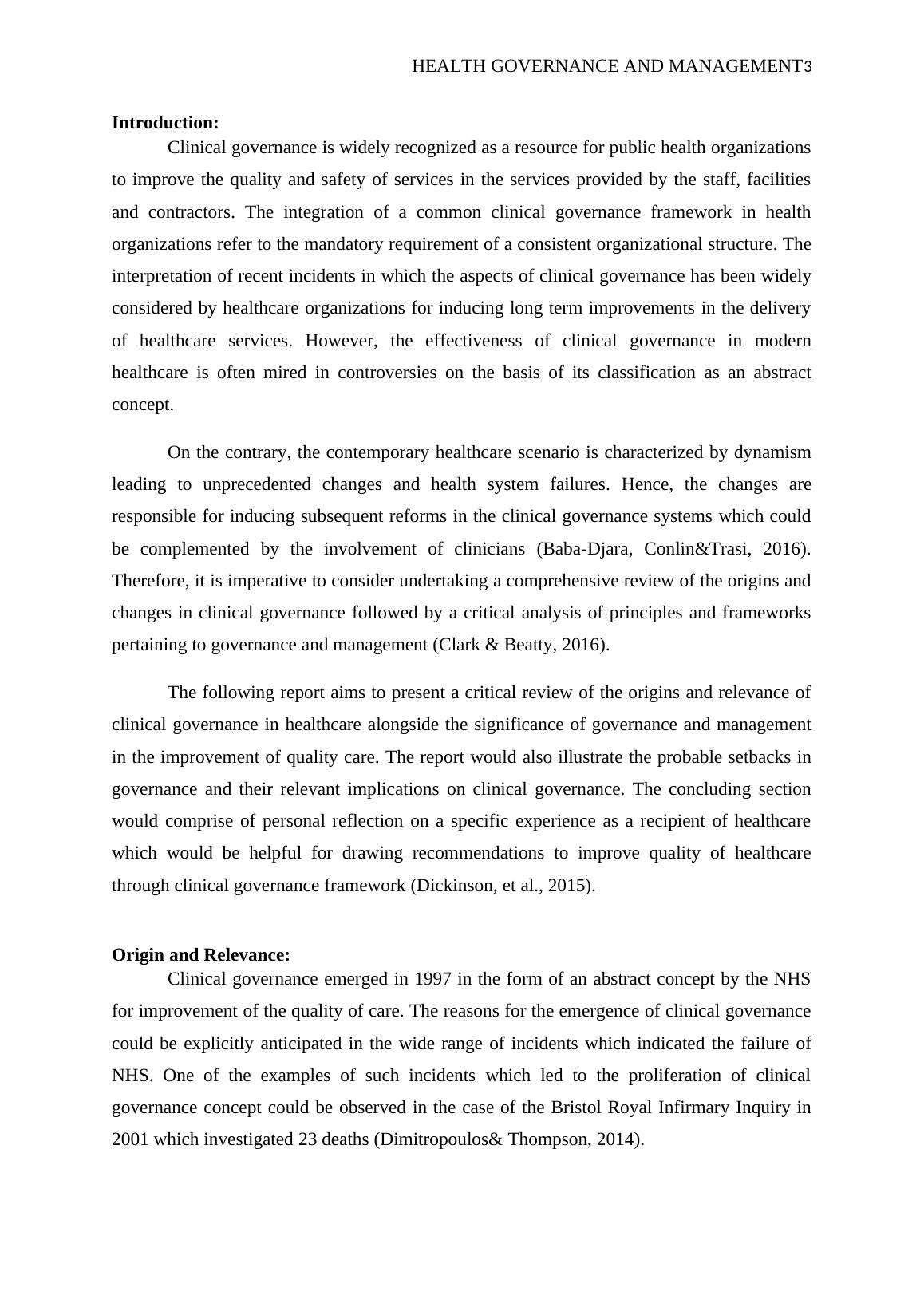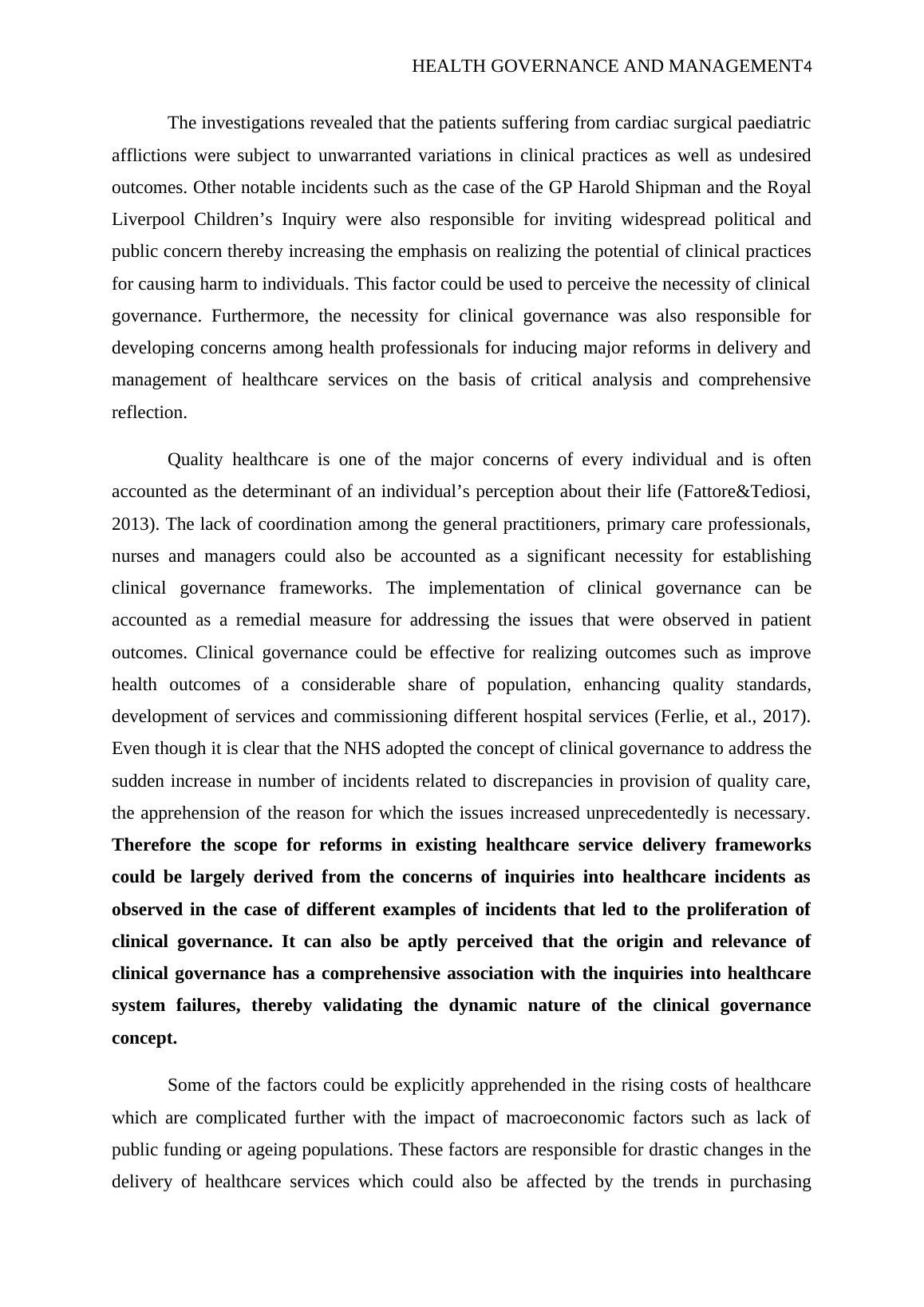Health Governance and Management Assignment
13 Pages4161 Words187 Views
Added on 2019-11-12
Health Governance and Management Assignment
Added on 2019-11-12
ShareRelated Documents
Running Head: HEALTH GOVERNANCE AND MANAGEMENT1Health Governance and Management<Student ID><Student Name><University Name>

HEALTH GOVERNANCE AND MANAGEMENT2ContentsIntroduction:...............................................................................................................................3Origin and Relevance:................................................................................................................3Governance and Management for Quality Care:.......................................................................5Issues with governance:.............................................................................................................7Personal reflection:.....................................................................................................................8Conclusion:................................................................................................................................9References..................................................................................................................................9

HEALTH GOVERNANCE AND MANAGEMENT3Introduction:Clinical governance is widely recognized as a resource for public health organizationsto improve the quality and safety of services in the services provided by the staff, facilitiesand contractors. The integration of a common clinical governance framework in healthorganizations refer to the mandatory requirement of a consistent organizational structure. Theinterpretation of recent incidents in which the aspects of clinical governance has been widelyconsidered by healthcare organizations for inducing long term improvements in the deliveryof healthcare services. However, the effectiveness of clinical governance in modernhealthcare is often mired in controversies on the basis of its classification as an abstractconcept. On the contrary, the contemporary healthcare scenario is characterized by dynamismleading to unprecedented changes and health system failures. Hence, the changes areresponsible for inducing subsequent reforms in the clinical governance systems which couldbe complemented by the involvement of clinicians (Baba-Djara, Conlin&Trasi, 2016).Therefore, it is imperative to consider undertaking a comprehensive review of the origins andchanges in clinical governance followed by a critical analysis of principles and frameworkspertaining to governance and management (Clark & Beatty, 2016).The following report aims to present a critical review of the origins and relevance ofclinical governance in healthcare alongside the significance of governance and managementin the improvement of quality care. The report would also illustrate the probable setbacks ingovernance and their relevant implications on clinical governance. The concluding sectionwould comprise of personal reflection on a specific experience as a recipient of healthcarewhich would be helpful for drawing recommendations to improve quality of healthcarethrough clinical governance framework (Dickinson, et al., 2015). Origin and Relevance:Clinical governance emerged in 1997 in the form of an abstract concept by the NHSfor improvement of the quality of care. The reasons for the emergence of clinical governancecould be explicitly anticipated in the wide range of incidents which indicated the failure ofNHS. One of the examples of such incidents which led to the proliferation of clinicalgovernance concept could be observed in the case of the Bristol Royal Infirmary Inquiry in2001 which investigated 23 deaths (Dimitropoulos& Thompson, 2014).

HEALTH GOVERNANCE AND MANAGEMENT4The investigations revealed that the patients suffering from cardiac surgical paediatricafflictions were subject to unwarranted variations in clinical practices as well as undesiredoutcomes. Other notable incidents such as the case of the GP Harold Shipman and the RoyalLiverpool Children’s Inquiry were also responsible for inviting widespread political andpublic concern thereby increasing the emphasis on realizing the potential of clinical practicesfor causing harm to individuals. This factor could be used to perceive the necessity of clinicalgovernance. Furthermore, the necessity for clinical governance was also responsible fordeveloping concerns among health professionals for inducing major reforms in delivery andmanagement of healthcare services on the basis of critical analysis and comprehensivereflection. Quality healthcare is one of the major concerns of every individual and is oftenaccounted as the determinant of an individual’s perception about their life (Fattore&Tediosi,2013). The lack of coordination among the general practitioners, primary care professionals,nurses and managers could also be accounted as a significant necessity for establishingclinical governance frameworks. The implementation of clinical governance can beaccounted as a remedial measure for addressing the issues that were observed in patientoutcomes. Clinical governance could be effective for realizing outcomes such as improvehealth outcomes of a considerable share of population, enhancing quality standards,development of services and commissioning different hospital services (Ferlie, et al., 2017).Even though it is clear that the NHS adopted the concept of clinical governance to address thesudden increase in number of incidents related to discrepancies in provision of quality care,the apprehension of the reason for which the issues increased unprecedentedly is necessary.Therefore the scope for reforms in existing healthcare service delivery frameworkscould be largely derived from the concerns of inquiries into healthcare incidents asobserved in the case of different examples of incidents that led to the proliferation ofclinical governance. It can also be aptly perceived that the origin and relevance ofclinical governance has a comprehensive association with the inquiries into healthcaresystem failures, thereby validating the dynamic nature of the clinical governanceconcept. Some of the factors could be explicitly apprehended in the rising costs of healthcarewhich are complicated further with the impact of macroeconomic factors such as lack ofpublic funding or ageing populations. These factors are responsible for drastic changes in thedelivery of healthcare services which could also be affected by the trends in purchasing

End of preview
Want to access all the pages? Upload your documents or become a member.
Related Documents
The Report of the Public Inquiry into children’s heart surgery at the Bristol Royal Infirmary 1984-1995lg...
|11
|2579
|246
Governance and Management Health Student Name Institution 1. Executive Summary 3 2.0 Governance 4 3.0 Principles of governance 5 3.2 Structure5 4.3 Framework8 5.0 Clinical governance 8 5.1.1 Origin oflg...
|15
|3724
|169
Examining a Public Inquiry Into a Health System Failure Research Paper 2022lg...
|7
|1584
|23
Policy, politics and nursing : Assignmentlg...
|19
|5187
|122
Governance and Management Report 2022lg...
|11
|3073
|24
Public Inquiry into Health System Failurelg...
|9
|1883
|54
